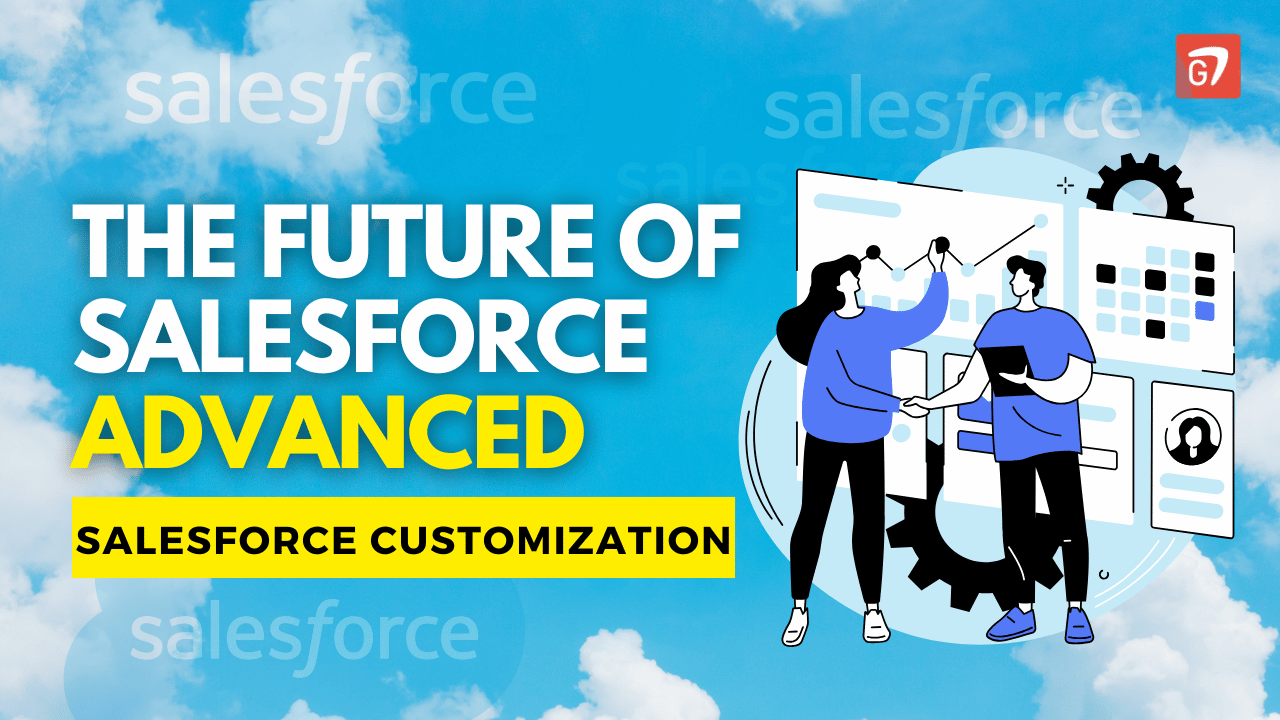Salesforce, the most popular (CRM) platform has continuously changed to meet the constantly changing requirements of companies. Since its beginnings as an instrument for customer service It has since evolved to become a robust and comprehensive ecosystem, which includes marketing, sales and service, commerce and many more. The evolution is fueled by an unstoppable seeking of new ideas and the determination to provide companies with the tools they require to thrive in the digital age.
The Rise of Advanced Salesforce Customization
Salesforce’s greatest strength is the platform’s flexibility and adaptability. Salesforce empowers companies to go beyond the basic configurations and go into more advanced customisation. This lets organizations tailor Salesforce to their individual requirements and procedures, increasing the value of Salesforce and delivering significant business results.
Key Trends Shaping the Future of Advanced Salesforce Customization
Quick Navigations:
1. Artificial Intelligence and Machine Learning Salesforce integration
AI and ML are revolutionizing Salesforce customization. Features such as Einstein Salesforce’s AI engine are becoming more sophisticated. We are likely to see more advanced predictive analytics as well as intelligent automation and customized customer experiences powered by AI. As an example, assistants powered by AI will simplify customer service and predictive models are able to predict trends in sales and determine the risk of a potential sale.
2. Low-Code/No-Code Development Platforms
The growth of platforms for development that are low-code or no-code has democratized Salesforce customization. These platforms allow those with little or no programming experience to design customized apps and workflows. This does not just speed up the development process but also encourages more collaboration between the IT, business and IT departments.
3. The Internet of Things (IoT) and Salesforce
Connecting IoT devices into Salesforce opens doors to new possibilities. When connecting physical devices with Salesforce, companies are able to gather valuable information about customer behaviour, improve operations and offer more customized experiences. For instance, a retailer firm could utilize IoT sensors to monitor the inventory levels in real time and create automated replenishment orders in Salesforce.
4. Blockchain and Salesforce
Blockchain technology can improve privacy, security and trust that comes to Salesforce data. Applications include secure sharing of data and record-keeping that is immutable, and the development of decentralized applications (dApps) that run on Salesforce. Salesforce platform.
5. Improved UX (UX) through Salesforce
Salesforce Lightning, the platform’s contemporary user interface, continues to grow with an emphasis on the user experience and efficiency. Expect more user-friendly interfaces, customized dashboards and user-friendly experiences designed for mobile that enable users to be more productive.
Advanced Customization Techniques
1. Einstein Bots and AI-Powered Assistants
- Einstein Bots: These intelligent chatbots are able to automate customer interactions across a variety of channels (web mobile, chat apps). They are able to answer commonly asked questions, give specific product recommendations and even help customers navigate complicated procedures.
- AI-powered Assistants: The assistants are more than simple chatbots. They use machine learning to learn about the customer’s needs, anticipate their needs, and proactively assist users within the Salesforce platform. For instance an AI-powered assistant could recommend relevant articles to a customer service representative in light of the current situation or even proactively warn sales reps of the possibility of deal risks.
2. Predictive Modeling and Forecasting using Salesforce
Salesforce Einstein offers advanced predictive features that allow companies to take data-driven decisions.
- The Predictive Lead: Scoring feature lets the sales team prioritize leads based on their probability of conversion.
- Forecasting Sales: AI algorithms can analyze the historical data and find potential roadblocks that could hinder sales to accurately forecast sales performance.
- Predicting Customer Churn: By identifying those who are at the risk of losing their customers, companies can take proactive action to implement targeted retention programs.
3. Building Hyper-Personalized Experiences
- Personalized Communication: Customize emails, marketing messages, and even in-app notifications in accordance with the preferences of each customer and behaviors.
- Product Recommendations: Use information from customers to suggest appropriate services and services, thus increasing the sales potential.
- Customized Service Experiences: Provide each customer with a distinct and personalized service experience, in light of their previous interactions and customer support history.
4. Leveraging Salesforce APIs for Seamless Integrations
- Third-Party Integrations: Integrate Salesforce with a variety of tools, like E-commerce and marketing automation systems and social media platforms.
- Custom Integrations: Create custom integrations to meet certain business needs, like linking Salesforce with internal database systems or other systems.
- Expanding Salesforce Functions: Use APIs to create custom applications and enhance the functionality of Salesforce. Salesforce platform to go beyond default capabilities.
5. The Role of Salesforce Partners and Consultants
With Salesforce continuing to grow by incorporating AI, IoT, and other innovative technologies, the demand for expert knowledge is growing.
- Being ahead of the curve: Salesforce Partners and Consultants have to constantly refresh their knowledge and capabilities to keep up with the latest developments within Salesforce. Salesforce ecosystem.
- Helping Customers: Find the Right Path to Success They play a vital role in advising customers about the most effective ways to use technology to reach their business objectives.
6. Consulting Services for Advanced Salesforce Implementations
- Strategy and Planning: Helping customers in setting their business goals and creating a plan to guide them through Salesforce implementation.
- Customization and Development: Customization and Development: Designing and developing custom integrations, applications, and workflows.
- Information Transfer and Integration: Moving data from systems that are already in use and connecting Salesforce to other business applications.
- Education and Support: Offering regular training and assistance to ensure an effective use and use of Salesforce. Salesforce platform.
7. Challenges and Considerations
As companies collect greater amounts of data and employ advanced technologies such as AI Data security and privacy are of paramount importance.
- Data breaches: The danger of data breaches is increased because of the interconnectedness between systems. Secure measures to protect your data, like security measures for data encryption and access controls and regularly scheduled security inspections are vital.
- Compliance: Keeping to the regulations regarding data privacy, such as GDPR and CCPA is vital. Companies must ensure that they have the appropriate security measures in place to safeguard personal data of customers and conform to all relevant laws.
- Ethical considerations: Using AI and data ethically is essential. Companies must be aware of possible biases within AI algorithms and make sure that data is used in a responsible manner and in a transparent manner.
8. Maintaining Scalability and Performance
- Performance bottlenecks: Adding complex customizations could affect the performance of a system. Regular tuning and optimization is essential to provide users with a smooth experience.
- Data volume increases: It is essential to make sure that Salesforce’s Salesforce platform is able to cope with the increase in workload. Cloud-based infrastructure can be scalable, however, careful planning and the allocation of resources are crucial.
9. The Need for Continuous Learning and Adaptation
- Staying Up-to-date: Business and their employees must continually be learning and adjusting to the latest capabilities, features, and best practices.
- Being Competitive: To stay in the game, companies must constantly examine their Salesforce systems and discover ways to improve and ingenuity.
10. Embracing Advanced Customization for Competitive Advantage
- Gaining an edge in the market: Through adjusting Salesforce to the specific needs of their business and processes, companies are able to distinguish themselves from their competitors and get better business results.
- The power of innovation: Advanced customization allows companies to explore, invent, and create new and creative solutions that help grow and increase customer satisfaction.
Conclusion
Salesforce’s future Salesforce customization is evidently vibrant and filled with creativity. While AI, IoT, and other innovative technologies continue to alter the landscape of business, Salesforce will evolve to offer the most robust and advanced capabilities. With advanced customization methods that allow businesses to unlock the full potential of Salesforce. This includes using AI-powered features, creating hyper-personalized experience, and effortlessly integrating Salesforce and other software.
It is crucial to take care of the problems associated with advanced customizations, like security of data, scalability and the necessity for continual learning. Through working with knowledgeable Salesforce consultants and placing a high priority on security of data and privacy, companies can tackle these issues and be able to successfully implement advanced adjustments. The end result is that embracing the new possibilities of Salesforce customization can help companies to gain a competitive advantage, strengthen relationships with customers, and drive significant growth in the constantly evolving digital world.
FAQ’s
What is the Salesforce AppExchange?
The Salesforce AppExchange is an online marketplace where you can find pre-built applications, integrations, and other solutions that can be easily added to your Salesforce org.
Can I customize Salesforce myself?
To a certain extent, yes. Salesforce provides tools like the Salesforce Platform and Flow Builder that allow users with limited coding experience to perform some customizations. However, complex customizations may require the assistance of a Salesforce Developer or Consultant.
Is Salesforce Customization expensive?
Expect to spend anywhere from a few thousand dollars for minor adjustments to over $100,000 USD for complex projects.
The cost of customization can vary depending on the complexity of the project. There are options available to suit different budgets, such as using AppExchange apps or leveraging low-code/no-code development tools.
How long does Salesforce Customization take?
The time required for customization depends on the scope and complexity of the project. Simple customizations can be completed quickly, while more complex projects may take several weeks or even months.
What are the risks associated with Salesforce Customization?
Potential risks include potential performance issues, data security vulnerabilities, and the possibility of customizations breaking during Salesforce upgrades. It’s crucial to work with experienced professionals and thoroughly test all customizations before deploying them.










